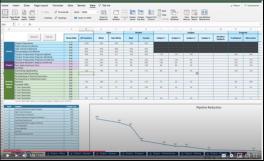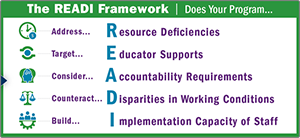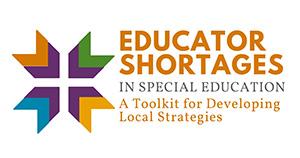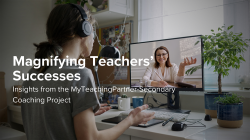Center on Great Teachers and Leaders
Building bridges from today's educator workforce challenges to a future where every student can thrive while learning from a talented and diverse educator workforce.

Resources
Explore our resources by topic area:
- Prioritize Systemic Talent Development
- Design Programs to Succeed Anywhere
- Address Shortages & Expand Equity
- Build Belonging
- Expand Pathways Into the Profession
- Elevate the Educator Profession
- Rethink Professional Learning
Prioritize Systemic Talent Development
Advancing Quality Teaching for All Schools: Examining the Impact of COVID-19 on the Teaching Workforce
Examine projections about the impact of COVID-19 on the teacher workforce and explore recommendations for addressing resulting challenges.
Investing in Talent Development: A Funding Guide for Supporting the Teacher Workforce with Federal, Private, and State Funds
Funding the important work of teachers can be supported through a variety of federal programs, private foundations, and state legislative appropriations. This guide identifies potential funding that can be leveraged by states, districts and educator preparation providers to address teacher professional growth and talent development across the full educator career continuum.

The Talent Development Data Tool
The Talent Development Data Tool is an easy-to-use, Excel-based tool to visualize teacher workforce data across the full educator career continuum. Users can disaggregate teacher workforce data to identify teacher shortages by segments like subject area, school type, income level, geographic area, and race or ethnicity.
The Talent Development Framework: Improving Access to Excellent Educators for All Students
Read the full Talent Development Framework (TDF) to begin your journey to proactively and purposefully address educator shortages and talent challenges in your local context. Our team can support your state in applying the principles of the TDF to meet the needs of your unique COVID-19 talent challenges.
Design Programs to Succeed Anywhere
The READI Framework: Design Programs to Succeed Anywhere

Underserved schools are often overlooked for district or state-wide initiatives because they may be perceived as lacking "readiness" for rigorous implementation. The READI Framework guides states and districts to examine five key barriers as they design programs and related supports for success in underserved schools.
Flipping the Readiness Paradigm
What does the READI Framework look like in practice? Explore this brief to see how the GTL Center has applied the READI Framework as a model in improving mentoring and induction programs and addressing educator shortages in underserved schools.
The READI Framework: Closing Gaps by Addressing the Needs of Low-Performing Schools
Explore the "readiness paradox," as well as the research and evidence behind the GTL Center's emphasis on designing programs to succeed anywhere, and especially in the schools that need them most.
Address Shortages & Expand Equity
Decision Points: Defining, Calculating, and Addressing Gaps in Access to Effective Educators
Explore four key decision points states should consider in measuring equitable access to effective educators. For each decision point, find state and local examples for initial determinations for equitable access policy and reporting, as well as ways states are supporting districts in identifying equity gaps.

Educator Shortages in Special Education: A Toolkit for Developing Local Strategies
Co-developed with the CEEDAR Center, this interactive tool helps users identify short-term strategies to meet immediate demand while paring them with long-term, systematic strategies that together create comprehensive solutions.
Equitable Access Toolkit and Implementation Playbook
Create a strategic, data-based plan for transforming equitable access in your state or district using our stakeholder engagement guide, root-cause analysis workbook, and data review tool. Next, implement your plan successfully using our communication guide, policy coherence and alignment guide, and tool for monitoring the progress of implementation.
Prioritizing an Integrated Approach to Educator Shortages and Workforce Diversity
Co-authored with the Center for Black Educator Development, our two briefs highlight three critical realities in education that create the foundation for educator shortages and diversity gaps while offering innovative strategies and examples of integrated educator shortage and diversity efforts across the talent development continuum.
Build Belonging
Beyond Selection and Hiring: Diversifying the Educator Workforce by Eliminating Barriers and Creating Pathways Throughout the Pipeline (July 2021)
In this three-part webinar series, discover free, user-friendly tools and GIS mapping to confront systemic inequities across the educator career continuum and change our systems—not just to recruit more teachers of color, but also to dismantle the inequitable and exclusionary practices that push teachers of color out of classrooms in the first place.
- Part 1: Eliminating Barriers and Creating Pathways
- Part 2: Tools and Experiences from the Field
- Part 3: Mapping the Educator Workforce Pipeline

Insights on Diversifying the Educator Workforce: A Data Tool for Practitioners
A free, user-friendly, Excel-based tool, this resource is the foundation for a data-driven process to help users identify and visualize the development of educator diversity gaps across the entire educator career continuum. Use the tool to ground a deep, data-rich conversation with planning teams and key partners, including through a geographic information systems (GIS) component to support place-based analysis.
A Leadership-Level Culture Cycle Intervention Changes Teachers' Culturally Inclusive Beliefs and Practices
Culturally inclusive practices are essential in creating environments where diverse students experience belonging and success. A new study demonstrates one way these achievement gaps may be mitigated by creating school cultures that are inclusive of interdependence. Findings from a research-practice partnership illustrate that a school leadership intervention can enhance teachers’ use of culturally inclusive teaching practices and improve student outcomes.
Prioritizing an Integrated Approach to Educator Shortages and Workforce Diversity
Co-authored with the Center for Black Educator Development, our two briefs highlight three critical realities in education that create the foundation for educator shortages and diversity gaps while offering innovative strategies and examples of integrated efforts across the talent development continuum.
What Does Equity Require of Me?
Authored by GTL Center's Tammie Causey-Konaté, this article in the Professional Learner highlights how to implement an equity inquiry cycle in order to take a systems approach to dismantling inequity.
Expand Pathways Into the Profession

Creating Pathways into the Profession While Building Diversity with Registered Teacher Apprenticeship Programs
Co-authored with the Branch Alliance for Educator Diversity, this brief can help state, district, and EPP partnerships intentionally design and implement registered teacher apprenticeship programs to increase teacher ethnoracial diversity in the workforce.
Emerging Pathways Into the Teacher Profession: Evaluating and Substantiating Their Effectiveness
In a new brief cowritten by AIR’s Center on Great Teachers and Leaders and the Center for Economic Evaluation, experts provide insights on how emerging pathways into the profession (e.g., Grow-Your-Own, teacher residency models, RTAPs) can be evaluated to determine their overall effectiveness and associated costs.
A Funding Guide for Supporting a Registered Teacher Apprenticeship Program With Federal and State Funds
Codeveloped with our partners at the CEEDAR Center, this funding guide is a helpful resource for practitioners and policy makers in the field trying to build an understanding of possible funding opportunities to grow and implement R-TAPs.

The Rising Cost of Becoming an Educator: Reimagining Pathways Into the Profession with Affordable, Cost-Effective, and Responsive Solutions
Assessing the impact of the student loan crisis on the teaching profession, this brief offers potentially promising and sustainable solutions that require reimagining current programming to include cost-effective and responsive solutions.
Take a Seat at the Table: The Role of Educator Preparation Programs in Teacher Apprenticeship Programs
AACTE, the GTL Center, and the CEEDAR Center co-authored this report and accompanying webinar to offer insights and recommendations for EPPs on how to be involved in the design and implementation of teacher RAPs alongside states and districts.
Elevate the Educator Profession
AIR's Teaching Conditions Survey
A valid, reliable survey centered on nine crucial teaching conditions factors, AIR's teaching conditions survey provides clients with dashboards and reports that visualize important feedback from teachers and noninstructional staff that policy-makers can use to improve teaching conditions, school culture, and school climate.
The Impact of a $10,000 Bonus on Special Education Teacher Shortages in Hawai'i
Co-authored with Center for Analysis of Longitudinal Data in Education Research (CALDER Center) at AIR and Boston University, this working paper examines the impact of a bonus policy implemented in 2020 by Hawai‘i Public Schools. Experts analyze how Hawai'i represents a unique but instructive case of how strategic financial incentives can help address special education teacher shortages.
Raising the Bar on Teacher Pay
Cowritten by the Teacher Salary Project, this brief presents a case for state and local policy makers to look at the data to make better decisions related to teacher salary increases. This brief highlights national research on current teacher salaries and their impact; outlines state-by-state data, exemplars, and guidance for making salary adjustments; and summarizes recent commitments to teacher pay made by state governors.
Teaching and Leading with Trauma-Informed Care (Webinar Series, 2020)
The series highlighted strategies specific to fostering resilience and well-being for educators, for educators as they work with their students, and for school leaders as they work to build trust and well-being in their school communities.
Access the webinars:
- What About You? Strategies for Supporting Educator Resilience and Trauma-Informed Self-Care
- What About Your Students? Supporting Student Well-Being and Resilience with Trauma-Informed Care
- What About Your School? Building Trust and Well-Being Through Trauma-Informed Communities
Teaching Conditions Toolkit: Using Data to Drive Teacher Retention
States and districts can use this five-part toolkit and handouts to create positive teaching and learning environments, raise teacher retention rates, and cultivate a positive school culture.
Teacher Leadership: Self-Assessment and Readiness Tools
The GTL Center's teacher leadership self-assessment and readiness tools can help educators as well as district and school leaders determine how prepared they are to implement or participate in a teacher leadership opportunity.
Teacher Leadership Toolkit 2.0: Strategies to Build, Support, and Sustain Teacher Leadership Opportunities
Designed to support states and districts in designing teacher leadership opportunities to facilitate meaningful change and support better outcomes for students. The toolkit includes a synthesis of research, current examples, and useful tools for design and implementation.
Compensation Matters: Recruiting and Retaining a Highly Qualified Workforce (Research Roundup, May 2024)
Our quarterly Research Roundup shares a quick summary of the most recently published studies on educator compensation. In this edition, learn about current versus historical compensation structures and how (or how not) compensations reforms can support expanding equity.
Rethink Professional Learning
Can a Teacher Professional Learning Program Reduce Teacher Burnout? (Briefing Paper, November 2023)
A new AIR impact study calls attention to a new potential lever to reduce teacher burnout—instructional coaching that focuses on teachers’ successes in the classroom. The study examined the impact of a program called MyTeachingPartner and found that the program increased participants' enthusiasm about teaching and lowered their negative sentiments about teaching.
Evidence-Based Practices to Support Equity: A Snapshot on Mentoring and Induction (2019)
To make informed policy decisions, use this snapshot to understand the basics of mentoring and induction strategies, including how states and districts have implemented these strategies and the empirical studies and evidence that demonstrate the effect of the strategies on educator and student outcomes.
Flipping the Readiness Paradigm (Special Issues Brief, September 2019)
What does the READI Framework look like in practice? Explore this brief to see how the GTL Center has applied the READI Framework as a model in improving mentoring and induction programs and addressing educator shortages in underserved schools.
Instructional Practices That Integrate Equity-Centered Social, Emotional, and Academic Learning (Brief, December 2021)
When students engage in SEL, they develop the social and emotional competencies (i.e., skills, attitudes, and knowledge) needed to be ready for and successful in college, careers, and life. This brief refines pioneering work on the integration of SEL with academics and specifically addresses 10 educator practices that promote social, emotional, and academic development.

Magnifying Teachers' Successes: Insights from the MyTeachingPartner-Secondary Coaching Project
MyTeachingPartner is a web-mediated, strengths-based instructional coaching program that works to help teachers improve the quality of classroom interactions to boost student engagement and academic achievement. Explore insights from the program in our interactive story.
Mentoring and Induction Toolkit 2.0: Supporting Teachers in High-Need Contexts
States can use this toolkit to facilitate meaningful conversations with districts about design and implementation for teacher mentoring and induction programs, particularly in underserved contexts. The toolkit includes summaries of research and best practices, relevant examples, and a streamlined action planning process.
Self-Assessing Social and Emotional Instruction and Competencies: A Tool for Teachers
The educational community is increasingly focused on the development of students’ social and emotional learning (SEL) competencies and the link between SEL and improved educational attainment and achievement. This self-assessment tool is designed to help educators reflect upon (1) their current teaching practices that impact student SEL, and (2) their own SEL competencies to implement those teaching practices.
10 Mentoring and Induction Challenges in Rural Schools and How to Address Them (Brief, August 2019)
Strong, locally designed mentoring and induction supports can help to address the unique challenges faced by rural schools related to beginning teacher development and retention. This brief outlines 10 common challenges encountered by rural schools when implementing mentoring and induction programs along with strategies to address the challenges and examples from the field.

